discomfort support

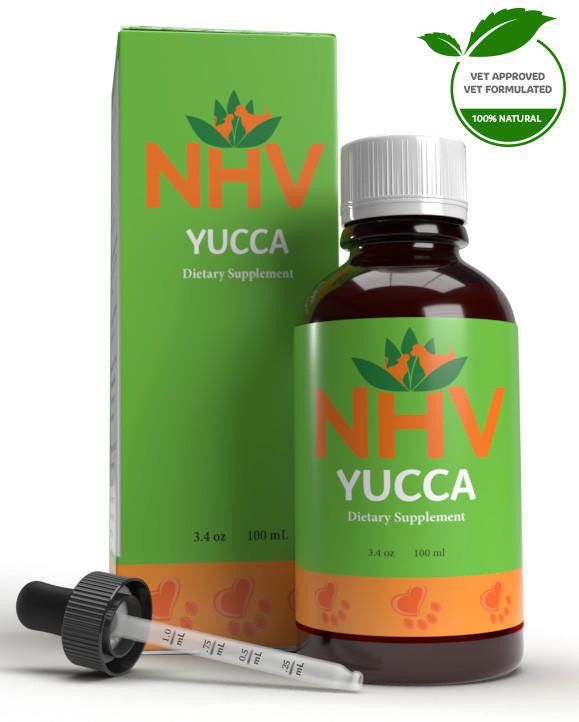
free shipping over $100 (USA & Canada)
1-877-937-4372 the pet expert hotline
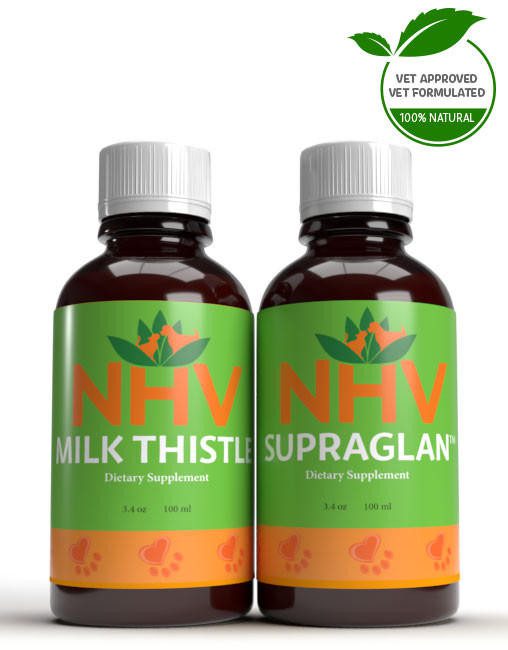

It’s a heavy burden we pet parents have when it comes to the health of our animal companions and the trust they place in us. So many pet parents we’ve spoken to want to know how to make their cat or dog healthier “naturally” without the common side effects of drugs. But knowing what to do, how to use supplements, and working with a veterinarian who may not be familiar with alternative methods can all be a little overwhelming. Our goal at NHV to help you ask the right questions so you can help your cat or dog achieve optimal health.
So, let’s get right into the great debate: alternative methods or conventional western therapies. NHV’s philosophy, which is articulated wonderfully by our lead holistic veterinarian, Dr. Hillary Cook, is why not use the “best of both worlds” by focusing on an integrative approach to healing.
Western medicine has given us many great advances, from accurately diagnosing illness to some seriously sophisticated surgeries like prosthetics for dogs. While holistic and natural medicines are seeing a resurgence in mainstream care due to their nourishment and ability to bring homeostasis to the whole body and their powerful healing with minimal side effects. It seems obvious that integrative veterinary medicine is the key to pet health, but how do we know which therapies to use? Ask questions!
If you are considering conventional western treatments, here are some questions to ask your veterinarian professional. We’ve also provided some integrative approaches to consider in helping with the healing of your pet.
Knowing any potential side effects will help you understand future consequences and will also help you determine how you can support the body while your cat or dog is undergoing treatment. Conventional western drugs often treat the symptoms but can leave the body open for other complications.
For example, steroidal drugs are often used to treat certain illnesses, like cancer or nervous disorders. Common side effects of steroidal drugs may be increased urination, liver disorders, and Cushing’s disease after prolonged use. However, you and your vet may have decided that the short-term use of the drug makes the most sense for your pet. At NHV, we back your decision and recommend that pet parent give supplements to help support the body while on the drug. In this case, we might recommend NHV Milk Thistle for the liver, NHV Supraglan to support the adrenal gland, ES- Clear for natural cancer support, and PetOmega-3 for general health.
Knowing how long recovery will take will help make the right decision for your pet.
Knowing how long recovery will take will help make the right decision for your pet. For example, if treatment is surgery, and recovery will be a difficult 6 months, and your animal companion is 18 years old, you may want to concentrate on the quality of life now and use supplements to support that life. You may also want to support surgical recovery with natural discomfort aids like NHV Yucca, a great appetite stimulant.
This is a big one. It’s hard to get rid of the symptom or the thing that is causing discomfort. Have a frank discussion with your veterinarian. Be honest about the quality of life. You may decide to forgo a particularly risky treatment and support your pet with supplements only, or vice versa.
Sometimes, we want to say that we’ll spend whatever it takes to keep our companions with us. But, even for those with the best intentions, unexpected costs can add to the stress. Get a quote. You won’t be judged for it, and you will be thankful you did.
If your vet is unfamiliar with alternative therapies, we suggest you either contact our lead holistic vet, Dr. Cook, for a consultation, or you contact the AVHMA (American Veterinary Holistic Medical Association) to find a holistic veterinarian near you. Some vets will be open to alternative therapies. We’ve encountered some conventional veterinarians, who have never used alternative therapies, and whose patients have used NHV products. We usually get a call from these vets, and they are surprised by the positive results they are seeing in their patients from NHV products. They tell us how now they’re exploring alternative therapies after having been inspired by their patients. The moral of the story: have an open dialogue with your veterinarian professional.
You may decide that using supplements only makes the most sense for your pet. At NHV Natural Pet Products, we’ve had many success stories by regular pet owners, veterinarians, and even teaching veterinary facilities like the University of Tennessee. Talk to your vet, watch your pet to see how they’re doing. You will know if the supplements are working for your individual cat or dog. Oh – And don’t forget to contact us, your NHV Pet Experts, if you have any questions.
Other popular alternative therapies for pets include acupuncture, aromatherapy, chiropractic care, nutritional therapy, osteopathy, and laser therapy. For a definition of these and other holistic therapies, you can see the AVHMA Holistic Veterinary Therapies page.
For those of you, who may be unfamiliar with what integrative medicine is, take a look at Dr. Cook’s video below.
discomfort support


Support for Discomfort and Appetite Stimulant
buy 2 and save $3
3 month supply for a small to medium size
NHV Yucca is used for cats as a supplement to provide nutrients, and may be helpful for discomfort, inflammation, and to increase or balance the appetite.


NHV Yucca is used for cats as a supplement to provide nutrients, and may be helpful for discomfort, inflammation, and to increase or balance the appetite.

Yucca is used in cat food as well as food for other animals around the world. Its root is a highly nutritious herb that’s rich in vitamin C, beta-carotene, B vitamins, magnesium, iron, calcium, manganese, protein, niacin, and phosphorus.
Yucca contains two very beneficial compounds: sarsasapogenin and smilagenin. These two compounds work on the mucous membranes of the small intestine. These compounds help with the penetration and absorption of minerals and vitamins. Sarsasapogenin and smilagenin are known as steroidal saponins (phytosterols) which act as precursors to corticosteroids produced naturally by the body.
Steroidal saponins support the immune function of the body while stimulating and supporting the production of its own corticosteroids and corticosteroid–related hormones. Due to this action, studies conducted on Yucca have shown that it may be beneficial and effective for discomfort relief and inflammation in conditions such as arthritis. Yucca for cats may also be a natural appetite stimulant and may also help reduce the production of urease, which contributes to the unpleasant odors of urine and feces in some cats.
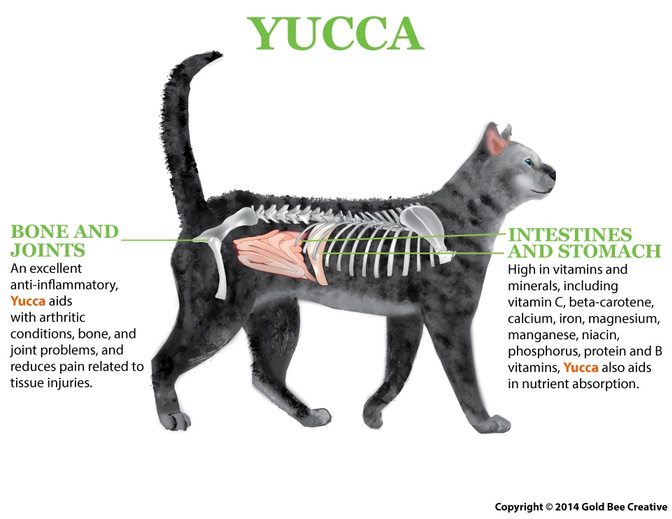
Yucca - Commonly used for supporting arthritis, as an anti-inflammatory, nutritive, antitumor, and digestive supplement.
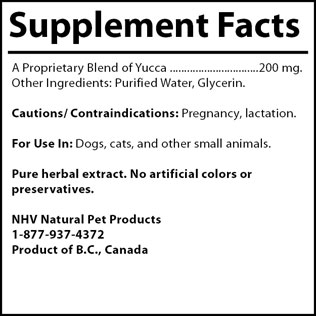
Select your pet's weight to determine the correct dose.
To be taken twice daily. Determine your pet’s weight and then use the easy chart below to determine the correct dose. This is the minimum dosage.
Pet's Weight Dosage
0 - 15 lb = 0.5 ml
16 - 30 lb = 1.0 ml
31 - 45 lb = 1.5 ml
46 - 60 lb = 2.0 ml
61 - 75 lb = 2.5 ml
Over 75 lb = 3.0 ml
How to Administer: Shake well before use. The easiest method is to use the dropper provided and place the drops into your pet’s food or favorite treat. You can also use the dropper and squirt directly into the pet’s mouth. Some pets can be finicky, if this occurs consider hiding the drops in foods most pet’s love such as fish, chicken, yogurt, or a favorite treat. If your pet only eats dry food then soak a few kibbles at feeding time.
For Best Results: Herbal dietary supplements are beneficial to the health and well-being of your pet and are safe for long-term use. Every pet responds to natural herbal supplements differently, therefore it is important to be consistent and administer the product daily. Supplements generally take two to four weeks to take effect, however this will vary from one animal to the next.
Product Storage:
All NHV Natural Pet Products are pure herbal extracts and contain no artificial additives, preservatives or coloring. Shelf life after opening is 6 months and must be refrigerated after opening.
Cautions and Contraindications
Do not use Yucca in pregnant or nursing animals.
Speak to your vet before using our products. A second visit is recommended if your pet’s condition does not improve, or deteriorates after continued use of the supplements. All information provided by NHV Natural Pet Products is for educational purposes only.
Yucca is used in cat food as well as food for other animals around the world. Its root is a highly nutritious herb that’s rich in vitamin C, beta-carotene, B vitamins, magnesium, iron, calcium, manganese, protein, niacin, and phosphorus.
Yucca contains two very beneficial compounds: sarsasapogenin and smilagenin. These two compounds work on the mucous membranes of the small intestine. These compounds help with the penetration and absorption of minerals and vitamins. Sarsasapogenin and smilagenin are known as steroidal saponins (phytosterols) which act as precursors to corticosteroids produced naturally by the body.
Steroidal saponins support the immune function of the body while stimulating and supporting the production of its own corticosteroids and corticosteroid–related hormones. Due to this action, studies conducted on Yucca have shown that it may be beneficial and effective for discomfort relief and inflammation in conditions such as arthritis. Yucca for cats may also be a natural appetite stimulant and may also help reduce the production of urease, which contributes to the unpleasant odors of urine and feces in some cats.

Yucca - Commonly used for supporting arthritis, as an anti-inflammatory, nutritive, antitumor, and digestive supplement.

Select your pet's weight to determine the correct dose.
To be taken twice daily. Determine your pet’s weight and then use the easy chart below to determine the correct dose. This is the minimum dosage.
Pet's Weight Dosage
0 - 15 lb = 0.5 ml
16 - 30 lb = 1.0 ml
31 - 45 lb = 1.5 ml
46 - 60 lb = 2.0 ml
61 - 75 lb = 2.5 ml
Over 75 lb = 3.0 ml
How to Administer: Shake well before use. The easiest method is to use the dropper provided and place the drops into your pet’s food or favorite treat. You can also use the dropper and squirt directly into the pet’s mouth. Some pets can be finicky, if this occurs consider hiding the drops in foods most pet’s love such as fish, chicken, yogurt, or a favorite treat. If your pet only eats dry food then soak a few kibbles at feeding time.
For Best Results: Herbal dietary supplements are beneficial to the health and well-being of your pet and are safe for long-term use. Every pet responds to natural herbal supplements differently, therefore it is important to be consistent and administer the product daily. Supplements generally take two to four weeks to take effect, however this will vary from one animal to the next.
Product Storage:
All NHV Natural Pet Products are pure herbal extracts and contain no artificial additives, preservatives or coloring. Shelf life after opening is 6 months and must be refrigerated after opening.
Cautions and Contraindications
Do not use Yucca in pregnant or nursing animals.
Speak to your vet before using our products. A second visit is recommended if your pet’s condition does not improve, or deteriorates after continued use of the supplements. All information provided by NHV Natural Pet Products is for educational purposes only.
discomfort support
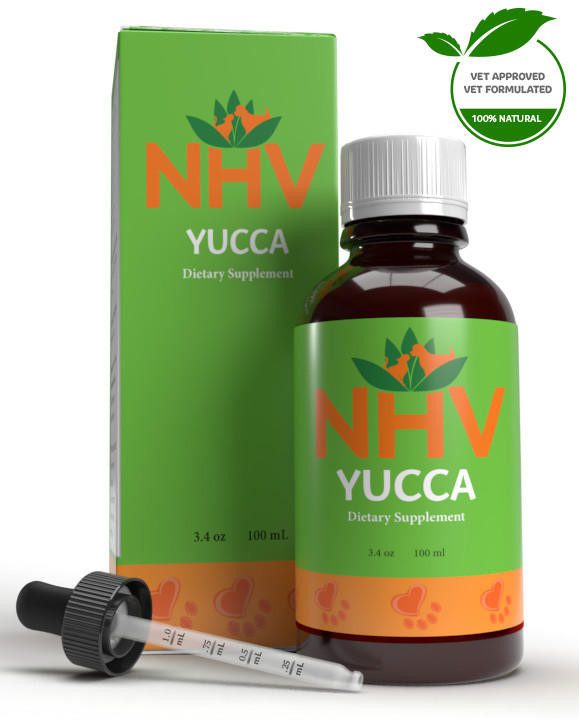
Discomfort Relief, Digestive Support, and Dog Appetite Booster
buy 2 and save $3
3 month supply for a small to medium size
Yucca for dogs is an all-natural supplement that can be helpful in many circumstances by providing symptom relief related to inflammation, discomfort, and loss of appetite.


Yucca for dogs is an all-natural supplement that can be helpful in many circumstances by providing symptom relief related to inflammation, discomfort, and loss of appetite.

Yucca root is widely used in dog food as well as in other pet foods. It is an herb that is highly nutritive as it is rich in vitamin C, beta-carotene, B vitamins, magnesium, iron, calcium, manganese, protein, niacin, and phosphorus. Yucca contains two very beneficial compounds: sarsasapogenin and smilagenin. These two compounds work on the mucous membranes of the small intestine. These compounds help with the penetration and absorption of minerals and vitamins. Sarsasapogenin and Smilagenin are known as steroidal saponins (phytosterols), which act as precursors to corticosteroids produced naturally by the body.
Steroidal-saponins support the immune function of the body while stimulating and supporting the production of its own corticosteroids and corticosteroid–related hormones. Due to this action, studies conducted on yucca have shown that it may be beneficial and effective for discomfort and inflammation in conditions such as arthritis. Yucca may also be effective as an appetite booster in dogs and may also help reduce the production of urease, which contributes to the unpleasant odors of urine and feces in some dogs.
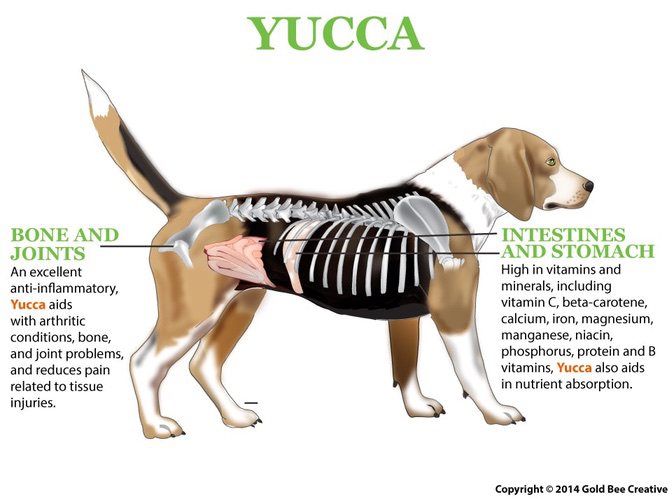
Yucca for dogs is commonly used for supporting arthritis, as an anti-inflammatory, nutritive, antitumor, and digestive. Yucca for dogs is considered a nutritive herb because it is rich in vitamins and minerals like vitamin C, beta-carotene, B vitamins, magnesium, iron, calcium, manganese, protein, niacin, and phosphorus.

Select your pet's weight to determine the correct dose.
To be taken twice daily. Determine your pet’s weight and then use the easy chart below to determine the correct dose. This is the minimum dosage.
Pet's Weight Dosage
0 - 15 lb = 0.5 ml
16 - 30 lb = 1.0 ml
31 - 45 lb = 1.5 ml
46 - 60 lb = 2.0 ml
61 - 75 lb = 2.5 ml
Over 75 lb = 3.0 ml
How to Administer: Shake well before use. The easiest method is to use the dropper provided and place the drops into your pet’s food or favorite treat. You can also use the dropper and squirt directly into the pet’s mouth. Some pets can be finicky, if this occurs consider hiding the drops in foods most pet’s love such as fish, chicken or yogurt or a favorite treat. If your pet only eats dry food then soak a few kibbles at feeding time.
For Best Results: Herbal dietary supplements are beneficial to the health and well-being of your pet and are safe for long-term use. Every pet responds to natural herbal supplements differently, therefore it is important to be consistent and administer the product daily. Supplements generally take two to four weeks to take effect, however this will vary from one animal to the next.
Product Storage: All NHV Natural Pet Products are pure herbal extracts and contain no artificial additives, preservatives or coloring. Shelf life after opening is 6 months and must be refrigerated after opening.
Cautions and Contraindications: Do not use Yucca in pregnant or nursing animals. Speak to your vet before using our products. A second visit is recommended if your pet’s condition does not improve, or deteriorates after continued use of the supplements. All information provided by NHV Natural Pet Products is for educational purposes only.
Yucca root is widely used in dog food as well as in other pet foods. It is an herb that is highly nutritive as it is rich in vitamin C, beta-carotene, B vitamins, magnesium, iron, calcium, manganese, protein, niacin, and phosphorus. Yucca contains two very beneficial compounds: sarsasapogenin and smilagenin. These two compounds work on the mucous membranes of the small intestine. These compounds help with the penetration and absorption of minerals and vitamins. Sarsasapogenin and Smilagenin are known as steroidal saponins (phytosterols), which act as precursors to corticosteroids produced naturally by the body.
Steroidal-saponins support the immune function of the body while stimulating and supporting the production of its own corticosteroids and corticosteroid–related hormones. Due to this action, studies conducted on yucca have shown that it may be beneficial and effective for discomfort and inflammation in conditions such as arthritis. Yucca may also be effective as an appetite booster in dogs and may also help reduce the production of urease, which contributes to the unpleasant odors of urine and feces in some dogs.

Yucca for dogs is commonly used for supporting arthritis, as an anti-inflammatory, nutritive, antitumor, and digestive. Yucca for dogs is considered a nutritive herb because it is rich in vitamins and minerals like vitamin C, beta-carotene, B vitamins, magnesium, iron, calcium, manganese, protein, niacin, and phosphorus.

Select your pet's weight to determine the correct dose.
To be taken twice daily. Determine your pet’s weight and then use the easy chart below to determine the correct dose. This is the minimum dosage.
Pet's Weight Dosage
0 - 15 lb = 0.5 ml
16 - 30 lb = 1.0 ml
31 - 45 lb = 1.5 ml
46 - 60 lb = 2.0 ml
61 - 75 lb = 2.5 ml
Over 75 lb = 3.0 ml
How to Administer: Shake well before use. The easiest method is to use the dropper provided and place the drops into your pet’s food or favorite treat. You can also use the dropper and squirt directly into the pet’s mouth. Some pets can be finicky, if this occurs consider hiding the drops in foods most pet’s love such as fish, chicken or yogurt or a favorite treat. If your pet only eats dry food then soak a few kibbles at feeding time.
For Best Results: Herbal dietary supplements are beneficial to the health and well-being of your pet and are safe for long-term use. Every pet responds to natural herbal supplements differently, therefore it is important to be consistent and administer the product daily. Supplements generally take two to four weeks to take effect, however this will vary from one animal to the next.
Product Storage: All NHV Natural Pet Products are pure herbal extracts and contain no artificial additives, preservatives or coloring. Shelf life after opening is 6 months and must be refrigerated after opening.
Cautions and Contraindications: Do not use Yucca in pregnant or nursing animals. Speak to your vet before using our products. A second visit is recommended if your pet’s condition does not improve, or deteriorates after continued use of the supplements. All information provided by NHV Natural Pet Products is for educational purposes only.
general wellbeing
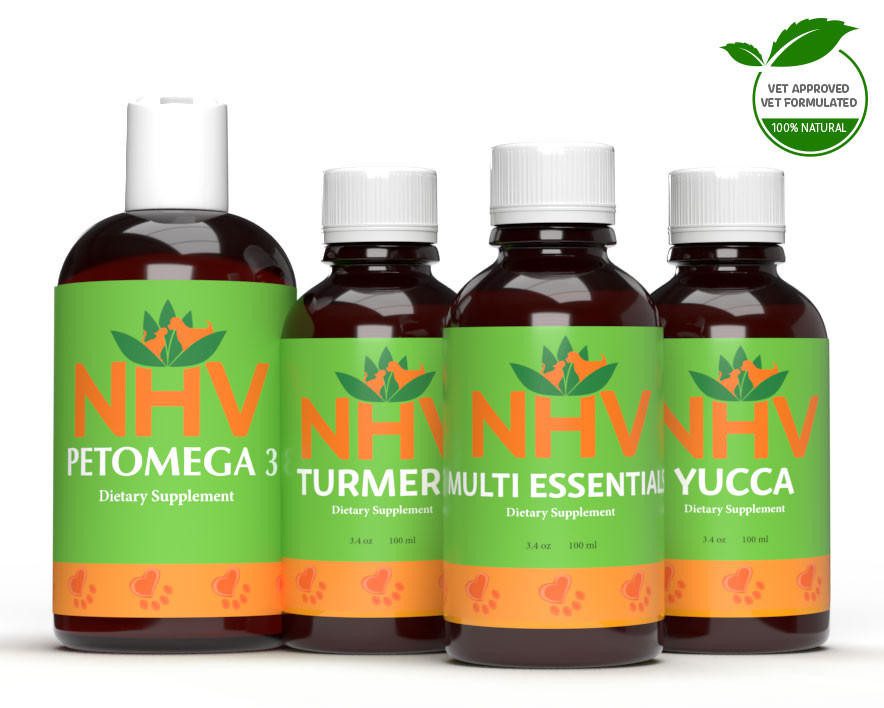
Holistic Daily Pet Vitamins for Cats and Dogs
bundle and save with pet expert kits
3 month supply for a small to medium size pet
Vitamins and minerals are essential to life - they help your dog or cat with their overall health and vitality by regulating the metabolism and supporting many other biochemical processes across the body.


Vitamins and minerals are essential to life - they help your dog or cat with their overall health and vitality by regulating the metabolism and supporting many other biochemical processes across the body.

Daily Nutritional Support for Pets
Without vitamins and minerals, your furkiddo may develop nutritional deficiencies that disrupt normal body functioning and can lead to chronic injury or illness. You may be wondering why your pet would benefit from daily dog vitamins or natural cat vitamins if they are getting everything they need from their food. Most commercial pet foods try their best to meet the minimum recommendations for vitamins and minerals set by regulating organizations like the AAFCO. However, things to keep in mind are:
Like humans, vitamins and minerals in our furbaby’s body work together synergistically rather than function as isolated chemicals. When we single out a vitamin, we may lose the balance that nature provides with interdependent co-factors (helper molecules) like trace minerals or phytochemicals. The best way for your pet to get the vitamins and minerals they need is to get them from whole plant sources rather than made synthetically in a lab. Our Daily Pet Supplement Bundle contains NHV Multi-Essentials, NHV Turmeric, NHV Petomega 3 and NHV Yucca. All of our supplements are full-spectrum and made from the finest quality herbs. Each blend is specifically formulated for pets. Full-spectrum means that all of the vitamins, minerals and trace elements are kept intact during the extraction process to make it bioavailable as daily dog vitamins or natural cat vitamins for your furkiddo.
How NHV’s Natural Daily Dog and Cat Vitamins Support Health and Vitality
NHV Multi Essentials is full of herbs that are rich in vitamins and minerals to help with many important body processes including healthy immune function and metabolism. Turmeric contains free-radical scavengers that may help reduce inflammation in the body; it is high in antioxidants which support healthy detoxification and liver function. Petomega 3 is beneficial for cardiac health, metabolism and healthy skin and coat. And Yucca is a highly nutritious superfood that promotes healthy absorption and a soothing aid for inflamed joints.
Multi Essentials
Turmeric
Petomega 3
Yucca
Help your Pet Live Their Best Life With NHV Supplements
In short, it’s a good idea to supplement your furkiddo’s daily diet with vitamins and minerals. All of our products are 100% natural and free of any artificial colors, additives or preservatives. Your pet’s health is important to us so if you have any more questions about using multivitamins to optimize their health, hit the button below to get in touch with an NHV Pet Expert.
Made with the finest, organically grown, or ethically harvested herbs. Made specifically for pets, vet-formulated and vet approved.
Multi Essentials
Turmeric
Petomega 3
Yucca
Select your pet's weight to determine the correct dose.
PETOMEGA 3 : Pet’s Weight Dosage to be taken once a day.
0-15 lb = ¼ tsp
15-30 lb = ½ tsp
30-60 lb = 1 tsp
60-90 lb = 1 ½ tsp
MULTI ESSENTIALS, TURMERIC, YUCCA DOSAGE : To be taken twice daily. Determine your pet’s weight and then use the easy chart below to determine the correct dose. This is the minimum dosage.
Pet's Weight Dosage
0 - 15 lb = 0.5 ml
16 - 30 lb = 1.0 ml
31 - 45 lb = 1.5 ml
46 - 60 lb = 2.0 ml
61 - 75 lb = 2.5 ml
Over 75 lb = 3.0 ml
How to Administer
Shake well before use.The easiest method is to use the dropper provided and place the drops into your pet’s food or favorite treat. You can also use the dropper and squirt directly into the pet’s mouth. Some pets can be finicky, if this occurs consider hiding the drops in foods most pet’s love such as fish, chicken or yogurt or a favourite treat. If your pet only eats dry food then soak a few kibbles at feeding time.
For Best Results
Herbal dietary supplements are beneficial to the health and well-being of your pet and are safe for long-term use. Every pet responds to natural herbal supplements differently, therefore it is important to be consistent and administer the product daily. Supplements generally take two to four weeks to take effect, however this will vary from one animal to the next.
Product Storage
All NHV Natural Pet Products are pure herbal extracts and contain no artificial additives, preservatives or coloring. Shelf life after opening is 6 months and must be refrigerated after opening.
Cautions and Contraindications
Do not use in pregnant or nursing animals.
All information provided by NHV Natural Pet Products is for educational purposes only.
All information provided by NHV Natural Pet Products is for educational purposes only.
Daily Nutritional Support for Pets
Without vitamins and minerals, your furkiddo may develop nutritional deficiencies that disrupt normal body functioning and can lead to chronic injury or illness. You may be wondering why your pet would benefit from daily dog vitamins or natural cat vitamins if they are getting everything they need from their food. Most commercial pet foods try their best to meet the minimum recommendations for vitamins and minerals set by regulating organizations like the AAFCO. However, things to keep in mind are:
Like humans, vitamins and minerals in our furbaby’s body work together synergistically rather than function as isolated chemicals. When we single out a vitamin, we may lose the balance that nature provides with interdependent co-factors (helper molecules) like trace minerals or phytochemicals. The best way for your pet to get the vitamins and minerals they need is to get them from whole plant sources rather than made synthetically in a lab. Our Daily Pet Supplement Bundle contains NHV Multi-Essentials, NHV Turmeric, NHV Petomega 3 and NHV Yucca. All of our supplements are full-spectrum and made from the finest quality herbs. Each blend is specifically formulated for pets. Full-spectrum means that all of the vitamins, minerals and trace elements are kept intact during the extraction process to make it bioavailable as daily dog vitamins or natural cat vitamins for your furkiddo.
How NHV’s Natural Daily Dog and Cat Vitamins Support Health and Vitality
NHV Multi Essentials is full of herbs that are rich in vitamins and minerals to help with many important body processes including healthy immune function and metabolism. Turmeric contains free-radical scavengers that may help reduce inflammation in the body; it is high in antioxidants which support healthy detoxification and liver function. Petomega 3 is beneficial for cardiac health, metabolism and healthy skin and coat. And Yucca is a highly nutritious superfood that promotes healthy absorption and a soothing aid for inflamed joints.
Multi Essentials
Turmeric
Petomega 3
Yucca
Help your Pet Live Their Best Life With NHV Supplements
In short, it’s a good idea to supplement your furkiddo’s daily diet with vitamins and minerals. All of our products are 100% natural and free of any artificial colors, additives or preservatives. Your pet’s health is important to us so if you have any more questions about using multivitamins to optimize their health, hit the button below to get in touch with an NHV Pet Expert.
Made with the finest, organically grown, or ethically harvested herbs. Made specifically for pets, vet-formulated and vet approved.
Multi Essentials
Turmeric
Petomega 3
Yucca
Select your pet's weight to determine the correct dose.
PETOMEGA 3 : Pet’s Weight Dosage to be taken once a day.
0-15 lb = ¼ tsp
15-30 lb = ½ tsp
30-60 lb = 1 tsp
60-90 lb = 1 ½ tsp
MULTI ESSENTIALS, TURMERIC, YUCCA DOSAGE : To be taken twice daily. Determine your pet’s weight and then use the easy chart below to determine the correct dose. This is the minimum dosage.
Pet's Weight Dosage
0 - 15 lb = 0.5 ml
16 - 30 lb = 1.0 ml
31 - 45 lb = 1.5 ml
46 - 60 lb = 2.0 ml
61 - 75 lb = 2.5 ml
Over 75 lb = 3.0 ml
How to Administer
Shake well before use.The easiest method is to use the dropper provided and place the drops into your pet’s food or favorite treat. You can also use the dropper and squirt directly into the pet’s mouth. Some pets can be finicky, if this occurs consider hiding the drops in foods most pet’s love such as fish, chicken or yogurt or a favourite treat. If your pet only eats dry food then soak a few kibbles at feeding time.
For Best Results
Herbal dietary supplements are beneficial to the health and well-being of your pet and are safe for long-term use. Every pet responds to natural herbal supplements differently, therefore it is important to be consistent and administer the product daily. Supplements generally take two to four weeks to take effect, however this will vary from one animal to the next.
Product Storage
All NHV Natural Pet Products are pure herbal extracts and contain no artificial additives, preservatives or coloring. Shelf life after opening is 6 months and must be refrigerated after opening.
Cautions and Contraindications
Do not use in pregnant or nursing animals.
All information provided by NHV Natural Pet Products is for educational purposes only.
All information provided by NHV Natural Pet Products is for educational purposes only.
Published: October 17, 2015